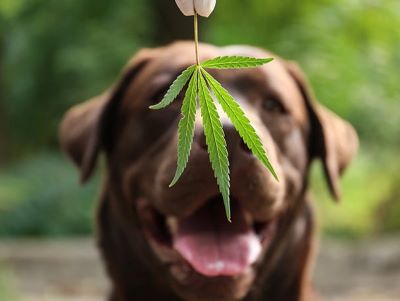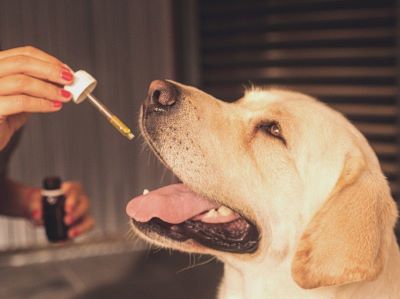If you ever find yourself in a situation where your beloved canine companion has accidentally consumed a substance and appears stoned or intoxicated, immediate action is crucial to help them recover.

In this article, we will explore effective methods on how to get a dog unstoned and provide them with the care they need.
By following the steps and seeking professional guidance when necessary, you can ensure the well-being and comfort of your furry friend.
Contents
How to Get a Dog Unstoned?
How to get a dog unstoned may be on your mind if you believe your dog has had marijuana exposure.
Dogs who use marijuana may have negative consequences include anxiety, drowsiness, low blood pressure, and respiratory issues.
Consequently, if your dog becomes stoned, it’s critical to take prompt action and seek veterinarian assistance. The following steps can be used to help a dog become sober:
Contact a Veterinarian or a Pet Poison Helpline
- The first and most important step is to contact a veterinarian or a pet poison helpline as soon as possible. They can advise you on what to do next and how to handle the situation.
- Be honest and provide as much information as possible, such as the type, amount, and time of exposure of marijuana.
- Depending on the severity of the intoxication, your veterinarian may recommend bringing your dog to the clinic for decontamination and supportive care.

- They may also suggest inducing vomiting at home if the ingestion occurred within the last hour or so, but only under their guidance.
- Do not attempt to unstone your dog at home or by yourself, as this may actually make their condition worse.
- Do not give them any food, water, or other substances without consulting your veterinarian first.
Keep Your Dog Calm and Comfortable
- Try to keep your dog relaxed and comfortable while you wait for veterinarian care.
- Cannabis[1] can make dogs anxious, paranoid, and hypersensitive, making them susceptible to stress and fear from their environment.
- Keep your dog away from any loud noises or bright lights in a quiet, well-lit space.
- If they are not vomiting, give them a comfy bed or blanket to rest on and some water to drink. Wait until your veterinarian says it is okay to feed them before doing so.
- Also, you may pacify your dog by giving them a gentle pet, speaking to them in a soothing tone, or playing quiet music.
- They may unwind and feel cherished by having their fur brushed or the tips of their ears massaged.
Monitor Your Dog’s Vital Signs and Symptoms
- Keep an eye on your dog’s vital signs and symptoms as you wait for medical assistance. Regularly check their gum color, respiration, pulse, and temperature.
- Call your veterinarian right away or transport your dog to the closest emergency facility if you observe any changes or indications of concern, such as trouble breathing, an erratic heartbeat, pale gums, or loss of consciousness.
- Observe any symptoms your dog may have, such as vomiting, drooling, twitching, peeing, or defecating, and note these as well.
- This can assist your veterinarian in determining the level of intoxication and in prescribing the proper course of action.
- Gather whatever marijuana exposure proof you can, including any leftovers, packaging, or vomit, if at all feasible.
- This can assist your veterinarian in diagnosing the type and quantity of marijuana that your dog smoked as well as the likely outcome.
What Happens When a Dog Gets Stoned?
Dogs are naturally curious and energetic creatures, but they occasionally cause difficulties by ingesting or inhaling things they shouldn’t. Marijuana is one of the things that might be bad for dogs since it can make them sick and cause other problems.

The Physiology of Marijuana and Dogs
- Cannabis is a plant that includes several cannabinoids, which have the ability to influence both the human and animal neural systems.
- Tetrahydrocannabinol (THC), which gives marijuana its intoxicating properties, is the most well-known cannabinoid.[2]
- Cannabinoid receptors are specialized receptors found in the brain and other organs that THC may bind to, changing how neurons and neurotransmitters normally work.
- Dogs are more susceptible to the effects of THC because they have more cannabinoid receptors in their brains than humans do.
- Dogs also process THC differently, which enables them to extend the effects of the drug by recycling it in their bodies.
- This increases the risk of marijuana toxicity in dogs, which can result from consuming or inhaling any part of the marijuana plant, including the buds, leaves, stems, edibles, oils, and butter.
Signs and Symptoms of Marijuana Intoxication in Dogs
The signs and symptoms of marijuana intoxication in dogs[3] can vary depending on the dose, the route of exposure, and the individual dog’s sensitivity. However, some common signs include:

- Stumbling and crossing over feet as if they are drunk (ataxia). This is the most common sign and occurs in about 88% of cases.
- Dullness and lethargy, but startle to catch their balance if they start to fall over. About 50% of dogs will also have dilated pupils and flinch in reaction to fast movements toward their face.
- Urinary incontinence or dribbling urine. This is also very common, especially in dogs.
- Vomiting, which may help to expel some of the ingested marijuana from the stomach.
- Tremors and shaking, which may indicate a high dose or a severe reaction.
- Agitation and excitement, which may occur in about 25% of dogs and may be related to the individual dog’s personality or the type of marijuana used.
- Low heart rate (bradycardia), which may be a sign of cardiovascular depression.
- Slow breathing (hypoventilation) and low body temperature (hypothermia), which may be signs of respiratory depression.
- In rare cases, coma, seizures, or death may occur if the dose is very high or if there are other complications.
Complications and Consequences of Marijuana Poisoning in Dogs
Dogs that have ingested marijuana may suffer major health and welfare effects. The following are some potential drawbacks and effects:
- vomiting, urine incontinence, or a decrease in fluid intake can all lead to dehydration and electrolyte imbalance.
- Inhaling vomit or smoke into the lungs may cause aspiration pneumonia.
- Damage to the liver that might be caused by the metabolism of THC or other toxins in marijuana.
- convulsions or persistent hypoxia (low oxygen) may both cause brain damage.
- Changes in behavior might be caused by long-term marijuana use or marijuana’s impact on the brain.
- Legal problems that may arise from breaking marijuana usage or possession laws.
How to Get a Dog Unstoned at Home?
You might be wondering how to naturally treat your dog if they’ve consumed or breathed marijuana. Cannabis can have negative affects for dogs, including anxiety, drowsiness, low blood pressure, and respiratory issues.

As a result, it’s critical to take prompt action and seek veterinarian assistance if your dog consumes marijuana.
There are some natural cures that may help your dog recover from being stoned, though, if your vet recommends you to take care of your dog at home or if you can’t quickly get in touch with a vet:
Provide Water and Food
- Giving your dog access to enough of fresh water to drink is among the most crucial natural treatments you can provide him.
- By doing so, they can avoid dehydration and wash out any poisons in their bodies. To enhance its flavor and nutritional value, you can also add electrolytes or chicken broth to the water.
- Feeding your dog modest, easily digestible meals or snacks that are rich in protein and fiber is another option.
- By doing so, you can encourage bowel motions in addition to helping them restore their energy and hunger.
- Boiled chicken, rice, eggs, yogurt, pumpkin, and peanut butter are a few examples of healthy diets for stoned dogs.
Use Herbs for Bladder Health
- Using herbs that promote bladder health and function is another natural remedy you may use on your dog.
- Cranberry, dandelion, marshmallow root, uva ursi, and parsley are some herbs that can aid in treating urinary tract infections, irritation, and stones.
- These herbs can be used orally or topically as teas, tinctures, capsules, or powders combined with food or water.
- To ensure the right dosage and necessary safety measures, talk to your veterinarian or a holistic health care provider before giving your dog any herbs.
- Certain herbs may conflict with drugs or have negative effects on particular breeds of dogs.
- Moreover, stay away from feeding your dog any plants that are poisonous to canines[4], such xylito, chocolate, raisins, raisin, onion, or garlic.
Use CBD Oil for Pain Relief
- Using CBD oil for pain treatment is another thing you can do to assist your dog in recovering from being stoned.
- Natural hemp plant extract CBD oil is known for its various canine health advantages. Inflammation, discomfort, anxiety, seizures, and nausea in dogs can all be decreased using CBD oil.
- Since it has little to no THC (the psychoactive ingredient in marijuana), CBD oil differs from marijuana in that it has no intoxicating or harmful effects on dogs.

- But, before giving CBD oil to your dog, be sure to talk to your veterinarian or a holistic health care provider about the right dosage and any necessary safety measures.
- The weight, age, and health of your dog are a few variables that might have an impact on the dose.
- Dropping CBD oil beneath your dog’s tongue or putting it in their food or drink are both effective oral administration methods for canines.
- If they’ve got any sores or illnesses, you may also administer it directly to their skin or ears.
FAQs
What can I do if my dog is stoned?
It’s critical to respond right away if you have reason to believe that your dog has consumed a chemical and is showing indications of intoxication or stonedness. For advice, start by getting in touch with your veterinarian or an urgent care veterinary facility. Based on your dog’s symptoms and health, they will be able to offer tailored guidance.
How long can a dog be stoned?
The amount of drug consumed, the dose, the size of the dog, and their particular metabolisms all affect how long can a dog stay “stoned” or drunk for. Dogs may experience the effects of some drugs more briefly while experiencing longer-lasting effects from others.
How do I know if my dog is high?
Signs of a high or intoxicated dog may include disorientation, unsteady movement, dilated pupils, changes in behavior, vomiting, tremors, or seizures. Seek veterinary help promptly.
Can dogs detect hash?
Dogs can be trained to detect hash or marijuana due to their strong sense of smell. However, intentionally exposing dogs to these substances is harmful and should be avoided.
Conclusion
In conclusion, How to Get a Dog Unstoned, it is essential to act swiftly and responsibly.
Contacting a veterinarian or a pet poison helpline should be your first priority, as their expertise will guide you through the necessary steps tailored to your dog’s specific situation.
Keeping your dog calm, monitoring their vital signs, and providing a comfortable environment are key aspects of aiding their recovery.
Additionally, natural remedies such as providing water and food, using herbs for bladder health, and incorporating CBD oil for pain relief can contribute to the process of getting your dog unstoned.
Remember, your furry friend’s well-being should always be paramount, and seeking professional assistance is crucial for their swift and safe recovery.
References:
- Cannabis (Marijuana) DrugFacts | National Institute on Drug Abuse. (2023, January 11). Retrieved July 18, 2023, from – NIH
- Joy, J., Watson, S. J., & Benson, J. M. (1999). Marijuana and medicine. In National Academies Press eBooks. – National Academies
- Pfeifer, M. (2020, December 7). Marijuana detected in multiple dogs – Texas A&M Veterinary Medical Diagnostic Laboratory. Texas a&M Veterinary Medical Diagnostic Laboratory. Retrieved July 18, 2023, from – TVMDL
- Cortinovis, C., & Caloni, F. (2016b). Household food items toxic to dogs and cats. Frontiers in Veterinary Science, 3. – Frontiers

Julia is a Board Certified Veterinary Nutritionist, practicing veterinarian in a non-profit animal hospital and feline sanctuary located in Rochester, NY. She is also a full-time veterinary advisor at DogLikesBest. She focuses on writing healthcare-related topics including dog foods, treats, veterinary diets, food for specific healthcare features, etc. Moreover, any article on DogNeedsBest that has to concern feline health in any way, goes under her scrutiny before being published.


